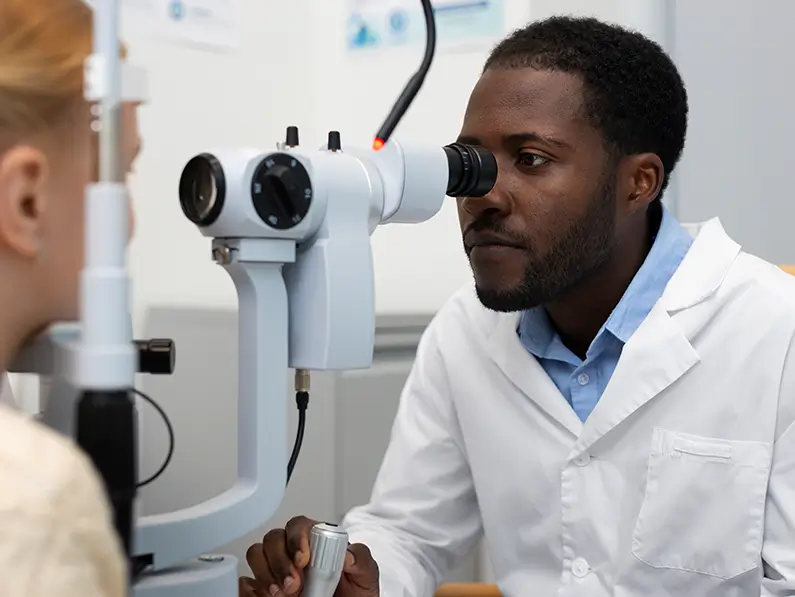Finding the perfect eye doctor is like finding a trusted friend, someone who not only takes care of your vision but also understands your lifestyle. In 2025, with rapid technological advancements and evolving treatment methods, choosing the right eye care professional is more critical than ever. This comprehensive guide walks you through the essential factors to consider when evaluating eye care providers, whether you’re looking for an optometrist or an ophthalmologist. In addition, we offer a global perspective on the top experts in various regions, along with tips on how to use patient testimonials and interviews to make an informed decision for your ocular health.
Global Leaders in Eye Care: Best Eye Doctors by Region (2025 Update)
In today’s interconnected world, top-tier eye care is not limited to one region. Experts around the globe are pushing the boundaries of what’s possible in ophthalmology and optometry. Recent data from reputable sources such as Bookimed, Newsweek, and PlacidWay confirms that the following professionals represent the pinnacle of global eye care. Here’s a look at some of the best by region:
North America
In the United States, renowned experts like Dr. Eric Donnenfeld have earned national acclaim. Regularly featured on Newsweek’s America’s Best Eye Doctors list, Dr. Donnenfeld brings over 20 years of experience in refractive and cataract surgery. Board certified by the American Board of Ophthalmology, his mastery of state-of-the-art laser technology and innovative treatment methods is validated by numerous awards and glowing patient testimonials. This reflects the current excellence in American eye care as of early 2025.
Europe
Across Europe, leaders such as Dr. Jordi Mones in Barcelona set the benchmark in vitreoretinal procedures. With extensive experience and certifications from prestigious European boards—including recognition from the European Board of Ophthalmology—Dr. Mones is an active member of the European Society of Cataract and Refractive Surgeons. His commitment to international clinical trials and groundbreaking research ensures his methods remain at the forefront of the field in 2025.
Asia
In Asia, institutions like Global Eye Clinic in India boast a team of ophthalmologists who combine rigorous local training with international expertise. Certified by bodies such as the Indian Ophthalmological Society, these professionals are frequently engaged in advanced research areas like LASIK, corneal transplantation, and retinal therapy. Their approach of blending cutting-edge technology with personalized care has made them a trusted choice for patients both locally and globally.
Middle East & Africa
The Middle East offers centers where specialists have made significant strides in areas like gene therapy and retinal treatments. Many top eye doctors in this region are affiliated with international institutions—such as Moorfields Eye Hospital in London—and are accredited by both local and global bodies. In Africa, facilities like Lions Eye Hospital in South Africa employ board-certified ophthalmologists dedicated to delivering comprehensive, state-of-the-art care, even for the most complex ocular conditions.
Australia
Australia’s eye care scene is equally impressive. Hospitals such as Sydney Eye Hospital lead with innovative diagnostic and surgical techniques. Australian ophthalmologists, certified by the Royal Australian and New Zealand College of Ophthalmologists, maintain a strong commitment to continuous professional development. This ensures that, in 2025, patients benefit from both the latest technology and a patient-centric approach to eye care.
Understanding Eye Care Professionals: Optometrists vs. Ophthalmologists
Choosing an eye doctor starts with understanding the two main types of professionals who care for your eyes: optometrists and ophthalmologists. Although both play vital roles in maintaining your vision, their training, expertise, and scope of services differ significantly.
What is an Optometrist?
Optometrists are primary vision care providers who perform comprehensive eye exams, prescribe corrective lenses, and diagnose common eye conditions. Their rigorous education typically includes a four-year undergraduate degree followed by four years in an optometry program. Consider optometrists your first line of defense in maintaining eye health—they’re invaluable for routine check-ups, early detection of problems, and managing age-related vision changes.
What is an Ophthalmologist?
Ophthalmologists are medical doctors specializing in eye and vision care. They complete medical school, followed by a residency in ophthalmology, and often pursue further specialization through fellowships. This extensive training equips them to handle complex eye diseases, perform surgeries, and manage advanced eye care treatments. If you need surgical intervention or have a complex diagnosis, an ophthalmologist is the expert you want on your side.
Key Qualifications and Certifications of Top Eye Doctors
Choosing a qualified eye doctor is about ensuring they meet the highest educational and professional standards. Here’s what to look for:
Education & Training Requirements
Top eye doctors invest years in honing their skills. For optometrists, this means a blend of academic excellence and hands-on clinical experience. Ophthalmologists, on the other hand, undergo comprehensive medical education and extensive surgical training. Look for details about a doctor’s educational background, years of experience, and any additional specialized training. These credentials are a strong indicator of their ability to handle everything from routine vision corrections to complex surgical procedures.
Board Certifications & Affiliations
Board certifications are the gold standard in medicine. They confirm that a doctor has met rigorous industry standards and is committed to staying current with the latest advancements. Certifications from reputable organizations—such as the American Board of Optometry or the American Board of Ophthalmology—are crucial. Affiliations with professional bodies like the American Academy of Ophthalmology or the International Optometric Association further attest to a doctor’s commitment to continuous professional development.
Evaluating Patient Testimonials and Reviews
In today’s digital age, patient testimonials and online reviews are invaluable resources for selecting an eye care professional. They provide first-hand insights into a doctor’s bedside manner, the effectiveness of treatments, and overall patient satisfaction.
How to Read and Interpret Patient Testimonials
Patient reviews can vary, so it’s important to look for patterns. Are there consistent mentions of a doctor’s compassionate care, effective treatment plans, or state-of-the-art technology? Also, pay attention to any recurring concerns such as long waiting times or poor follow-up care. Cross-referencing reviews from multiple platforms—such as Google, Healthgrades, and social media—can give you a clearer picture of what to expect.
Interviewing Eye Care Professionals: Tips for Success
After narrowing down your options, meeting with potential eye care providers is the next step. Personal interaction can reveal much about a doctor’s communication style, professionalism, and approach to patient care.
Essential Interview Questions
When interviewing an eye doctor, consider asking:
- What are your primary areas of expertise?
(This helps ensure their specialty aligns with your needs.) - Can you explain your treatment philosophy?
(Understanding their approach will help build trust.) - What technologies do you use in your practice?
(State-of-the-art equipment can enhance diagnosis and treatment.) - How do you handle follow-up care?
(Continuity of care is essential for long-term eye health.) - Are you affiliated with any professional organizations?
(This indicates their commitment to ongoing education and best practices.)
These questions not only help assess a doctor’s qualifications but also help build the trust and comfort that are key to a successful patient-doctor relationship.
Future Trends in Eye Care Staffing
The landscape of eye care is constantly evolving. Staying informed about emerging trends is essential for making a well-rounded decision.
Emerging Technologies and Practices
The integration of technology into eye care is revolutionizing the field. Some of the most exciting trends include:
- Telemedicine:
Virtual consultations are making eye care more accessible, particularly for those in remote areas. Imagine receiving a preliminary diagnosis from the comfort of your home! - Artificial Intelligence (AI):
AI systems are now capable of analyzing eye images with remarkable accuracy. They are particularly promising in detecting early signs of conditions like diabetic retinopathy and glaucoma. - Personalized Treatment Plans:
Advances in genetic research and data analytics are paving the way for treatments tailored to an individual’s unique genetic makeup and lifestyle. - Innovative Surgical Techniques:
Minimally invasive procedures and advanced laser treatments are reducing recovery times and improving patient outcomes, allowing patients to return to their daily routines with minimal downtime.
These trends indicate a bright future for eye care, where precision, accessibility, and patient-centric approaches will continue to transform the industry.
Conclusion
Choosing the right eye doctor is one of the most important decisions you can make for your overall health and quality of life. In 2025, with rapid advancements in technology and innovative treatment methods, the field of eye care offers more effective and personalized options than ever before. Whether you’re seeking routine vision care from an optometrist or advanced surgical treatments from an ophthalmologist, paying close attention to qualifications, certifications, and patient feedback is essential. By asking the right questions and staying informed about emerging trends, you can confidently navigate the evolving landscape of eye care and ensure that your vision remains in expert hands.
Remember, your eyes are not just organs—they’re your connection to the world. Trusting them to a skilled professional means investing in a brighter, clearer future.
FAQ: Your questions answered
How can I tell the difference between an optometrist and an ophthalmologist?
Optometrists focus on routine eye exams, corrective lenses, and basic eye care, while ophthalmologists are medical doctors who perform surgeries and manage complex eye conditions.
What certifications should I look for when choosing an eye doctor?
Look for board certifications from reputable organizations such as the American Board of Optometry or the American Board of Ophthalmology, along with affiliations to bodies like the American Academy of Ophthalmology.
How important are patient testimonials in choosing an eye doctor?
Patient testimonials provide valuable insights into the doctor’s bedside manner, treatment effectiveness, and overall patient satisfaction. Cross-referencing reviews across multiple platforms can give you a well-rounded perspective.
What questions should I ask during my consultation?
Ask about the doctor’s areas of expertise, treatment philosophy, the technologies used in their practice, how they handle follow-up care, and any professional affiliations they maintain.
What future trends should I be aware of in eye care?
Keep an eye on advancements in telemedicine, artificial intelligence for diagnostics, personalized treatment plans based on genetic research, and innovative minimally invasive surgical techniques.



